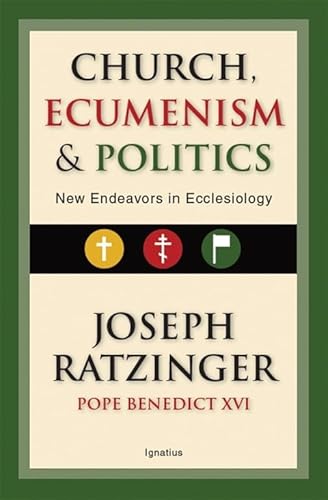Church, Ecumenism and Politics
New Endeavors in Ecclesiology
Joseph Cardinal Ratzinger
BOOK REVIEW

In Church, Ecumenism and Politics: New Endeavors in Ecclesiology, Joseph Cardinal Ratzinger, now widely recognized as Pope Emeritus Benedict XVI, takes readers on an evocative journey through the profound interplay between faith, political structures, and ecumenical dialogue. This isn't just a book; it's a clarion call, urging every reader to confront their own beliefs and the broader role of the church in an increasingly fragmented world. 🌍
Ratzinger's exploration roots itself in the chaos of modernity. As societies grapple with division and relentless questioning of religious authority, he boldly navigates the tumultuous waters of ecclesiastical identity and its interaction with political landscapes. The essence of his argument resonates with urgency: ecumenism is not merely a theological concept but an essential endeavor demanding our immediate attention and engagement. Few have dared to dissect the complexities of ecclesiology like he does, making this work a defining beacon for scholars and laypersons alike.
Born into a world titanic in intellectual upheaval, Ratzinger's formative years were steeped in the shadows of war, the decline of faith, and a yearning for unity. He doesn't merely theorize-he speaks from the depths of experience, channeling the struggles faced by the church as it attempts to maintain relevance in a society saturated with skepticism and fragmented truths. His philosophical underpinnings challenge us, the readers, to reflect deeply on our own spiritual journeys. Are we mere spectators in our faith, or are we active participants in the broader ecclesiastical drama? 🔍
Let's delve deeper into how Ratzinger juxtaposes ecclesiology with contemporary political issues. He compellingly argues that the church must step beyond self-imposed boundaries, engaging with the world of politics not as a separate entity but as an intrinsic participant. This is where the urgency is palpable: as divisions grow within and outside the church, the demand for a cohesive voice is louder than ever. His doctrine reminds us that dialogue can lead to transformative encounters-not only within the sacred but also through political spheres. The church's voice can resonate in legislation, social justice, and public morality.
Readers have expressed a rich tapestry of opinions about the book, ranging from adoration to critique. Loyal followers praise Ratzinger's eloquence and depth of insight, while critics lament potential dogmatism. Yet, this dichotomy is exactly what makes this work compelling-it's not meant to be a tranquil read but rather a invigorating challenge. Defenders of the text underline how Ratzinger deftly avoids simplification; instead, he emphasizes the rich complexity of the church's mission and its ecumenical pursuits. He calls for unity amidst diversity-a notion that is as inspiring as it is daunting.
Moreover, historical context looms large over his arguments. Written during a time when secularism was making significant inroads, Ratzinger's voice was a counterweight, insisting that the church remain a pulsating heart within society rather than a relic of the past. His propositions resonate particularly today, as we wrestle with issues of identity, morality, and the future of global consciousness. It's a reminder to us that the echoes of the past can illuminate pathways toward a unified future. 🌟
Ratzinger doesn't shy away from polarizing themes. He tackles contentious issues head-on, underscoring how the church can bridge divides, not only within its ranks but also across global religious frontiers. This is where readers feel the weight of his plea-a stark warning against complacency. The implications of neglecting this ecumenical endeavor could result in deepening chasms not just in church communities, but in the fabric of society itself.
If you think you can afford to overlook this work, think again! Church, Ecumenism and Politics is not just an academic treatise but a passionate discourse that pushes you out of your comfort zone. It shocks you into confronting the real consequences of disengagement from faith discussions and political accountability. This book serves as a reminder that the stakes are high, and the moments of choices are as fleeting as they are critical. 🔥
In summation, Ratzinger's exploration is a call to arms for those with the audacity to reflect, engage, and act. He holds up a mirror to our collective consciousness-inviting every one of us to ponder: how are we contributing to the varied yet interconnected tales of faith and governance? So, if you're ready to dive into a world where faith collides with politics, where unity breeds diversity, and where your convictions are put to the test, then this book is your doorway to awakening. Embrace the challenge, let the discourse flow, and watch how it transforms your understanding of the church's role in this ever-evolving political landscape.
📖 Church, Ecumenism and Politics: New Endeavors in Ecclesiology
✍ by Joseph Cardinal Ratzinger
🧾 276 pages
2011
#church #ecumenism #politics #endeavors #ecclesiology #joseph #cardinal #ratzinger #JosephCardinalRatzinger